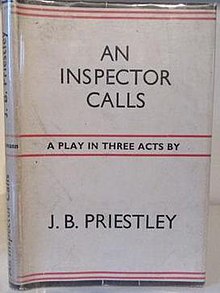Our website is made possible by displaying online advertisements to our visitors.
Please consider supporting us by disabling your ad blocker.
An Inspector Calls
| An Inspector Calls | |
|---|---|
 First edition (1947) with dust jacket | |
| Written by | J. B. Priestley |
| Date premiered | 6 July 1945 |
| Place premiered | Moscow, Soviet Union |
| Original language | English |
| Genre | Drama |
| Setting | Edwardian England |
An Inspector Calls is a modern morality play and drawing room play written by English dramatist J. B. Priestley, first performed in the Soviet Union in 1945[1][2] and at the New Theatre in London the following year.[3] It is one of Priestley's best-known works for the stage and is considered to be one of the classics of mid-20th century English theatre. The play's success and reputation were boosted by a successful revival by English director Stephen Daldry for the National Theatre in 1992[4] and a tour of the UK in 2011–2012.
The play is a three-act drama which takes place on a single night on 5 April 1912.[5] The play focuses on the prosperous upper-middle-class Birling family,[6] who live in a comfortable home in the fictional town of Brumley, "an industrial city in the north Midlands."[5] The family is visited by a man calling himself Inspector Goole, who questions the family about the suicide of a working-class woman in her mid-twenties. Long considered part of the repertory of classic drawing-room theatre, the play has also been hailed as a scathing criticism of the hypocrisies of Victorian and Edwardian English society and as an expression of Priestley's socialist political principles. The play is notable amongst students as many British schools study it as a prescribed text for the GCSE English Literature course.[7]
- ^ "An Inspector Calls – Context and Political Views". OxNotes – English Literature Notes. England: OxNotes.com. Archived from the original on 8 October 2018. Retrieved 8 October 2018.
- ^ "An Inspector Calls: a riveting drawing room play". New Age. 14 December 2018.
- ^ "J B Priestley's scrapbook containing programmes and reviews for An Inspector Calls". The British Library. Archived from the original on 21 June 2021. Retrieved 29 September 2019.
- ^ Stringer, Jenny (1996). The Oxford companion to twentieth-century literature in English. Oxford, England: Oxford University Press. p. 330. ISBN 978-0-19-212271-1.
- ^ a b Priestley, J. B. (1947). Bezant, Tim (ed.). An Inspector Calls: A Play in Three Acts (1992 ed.). London: Heinemann. pp. xi–xiv. ISBN 0-435-23282-7.
- ^ Gale, Maggie (2004). "Theatre and drama between the wars". In Nicholls, Peter; Marcus, Laura (eds.). The Cambridge history of twentieth-century English literature. Cambridge, England: Cambridge University Press. p. 328. ISBN 0-521-82077-4.
the middle class family was at the centre of much of Priestley's work ... most clearly perhaps in 'An Inspector Calls'.
- ^ "Modern texts and poetry". www.aqa.org.uk. Retrieved 4 March 2024.
Previous Page Next Page


